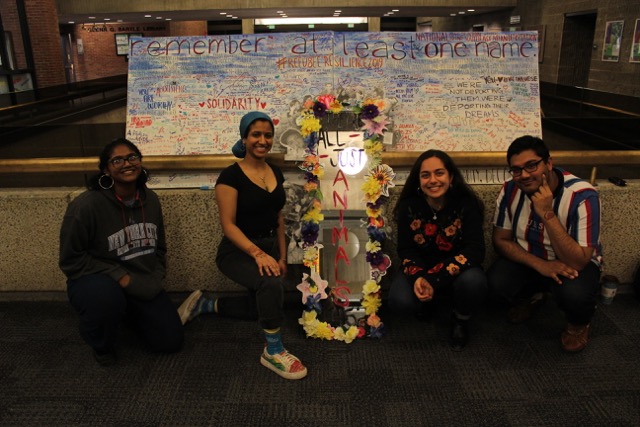
On Feb. 1, Decol A, a new campus organization dedicated to Asian American activism, put up an installation in Glenn G. Bartle Library titled “Through The Looking Glass: Remember At Least One Name.” This installation is a memorial that pays respects and brings awareness to Southeast Asian Americans who have been deported under the Trump administration.
The installation consists of two parts: a poster board and a mirror. Viewers of the installation are encouraged to write on the poster, whether it’s their personal thoughts on the nature of immigration in the United States or simply words of encouragement. Comments like “We stand with you,” “No human being is illegal” and “We’re not deporting them, we’re deporting their dreams” cover the canvas.
Decol A curated the installation to encourage observers to reflect on their place in the United States and how their livelihoods are interconnected with the struggles of other Americans. This process of self-reflection is mediated by the mirror that’s placed in front of the poster, where observers who stand in front of the installation become a part of it. The edges of the mirror are covered by pictures of Southeast Asian deportees and flowers to symbolize loss. Written on the mirror glass is the phrase “All Just Animals,” which is meant to evoke a self-critical response.
According to Decol A, the purpose of the installation is to bring public awareness to an issue that isn’t talked about enough. Although Immigration and Customs Enforcement (ICE) deportations, migrant detention centers and the separation of Central American families have extensively been covered by mainstream media, the Southeast Asian American deportations have only been marginally covered. Similar to the repatriation of documented and undocumented Latin American immigrants, Southeast Asian communities have also been experiencing this struggle long before President Donald Trump brought national attention to it.
According to the Southeast Asia Resource Action Center, a civil rights organization whose goal is to empower and achieve justice for the Southeast Asian American community, over 16,000 Southeast Asian Americans from Vietnam, Laos and Cambodia have been deported since 1998. Cambodian Americans who hold criminal histories, in particular, have been facing deportations since the beginning of 2002 under the Bush administration, their past sentences weaponized to justify their repatriation.
Migrants from Southeast Asian countries, mirroring the case of Central American migration, have poured into the United States to escape state violence in their countries of origin. Ironically, this violence was produced by U.S. imperialism and military intervention. During the Vietnam War, for example, the United States dropped almost 3 million tons of bombs on Cambodia. The physical destruction of Cambodia resulted in the rise of the Khmer Rouge, a guerrilla-led government regime characterized by a period of bloody brutality and death. Thus, Cambodian refugees fled their countries and poured into the United States to escape violent repression.
Fast-forwarding to the present, this trend of Southeast Asian American deportations has exponentially increased by the Trump administration’s loosening of refugee protection measures. According to The Nation, ICE estimates that 1,900 Cambodian immigrants hold deportation orders since September 2018. This number of deportees is drastically larger than the 29 Cambodians who were deported in 2017, according to The New York Times. Similarly, the White House is putting pressure on Vietnam to loosen a 2008 agreement that protects Vietnamese American refugees who arrived in the United States before July 12, 1995 from being deported — the date that diplomatic relations were re-established between the two after the Vietnam War.
Southeast Asians who’ve been deported are now faced with uncertain futures and unfortunate realities. Southeast Asian deportees who were born in the United States must now learn to adjust to living in countries that are foreign to them — one with a culture, lifestyle and language they are unfamiliar with. They must also deal with the fact that they are now living in a new country alone and separated from their families, residing in squalid housing conditions due to a lack of capital.
While Decol A aims to continue spreading public awareness on pertinent Asian American issues such as Southeast Asian deportations, its actions are all connected to a larger goal: to decolonize the Asian American diaspora.
“We are Binghamton’s first group dedicated to activism and liberation of the Asian-American diaspora,” said Dheiva Moorthy, president of Decol A and a freshman double-majoring in environmental studies and sociology. “We are committed to the fact that ‘Asian’ and ‘Asian American’ don’t refer to citizenship statuses or papers, but the ongoing political struggle of our pan-ethnic communities.”
Although the installation has now been taken down, Decol A wants to keep the conversation on Southeast Asian deportations going outside of BU.
“We plan to send the poster along with packages of menstrual products and other necessities to D.C. and hopefully an ICE detention center,” Dheiva said.


